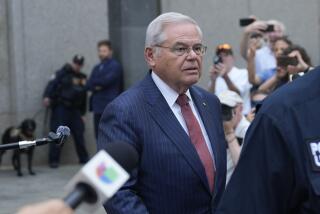Argentine Leader Forgoes 3rd Term but Strives for History
- Share via
BUENOS AIRES — With a combination of political vision, instinct and subterfuge, President Carlos Menem made the Argentina of the 1990s the Menem era.
Those qualities, which lead political analysts to compare him to a chess player who sees 10 moves ahead, are on full display these days as a result of Menem’s surprise announcement that he will not seek a third term.
In recent months, significant national developments here--the arrest of an aging former dictator, overtures to Britain regarding the disputed Falkland Islands--were interpreted as part of a well-orchestrated plan to improve the president’s image and change the constitution to allow another Menem candidacy.
But the opposition, the church and factions of the president’s own center-right Peronist party united against the effort. The increasingly bitter party schism finally persuaded the Peronist patriarch to bow out in typically inscrutable and theatrical fashion: Only days after admitting for the first time that he wanted to run, he announced that he will not be a candidate for an unprecedented third term next year.
“I aspire to place the presidential sash on another Peronist president who will continue the revolution we began,” said Menem, 68, who had already engineered a change in the constitution to win reelection in 1995.
The decision was a sign that this young democracy is one of the healthiest in a continent where free elections are widespread but where strong and independent legislatures and judiciaries are not. The power amassed by populists such as Menem and Peru’s Alberto Fujimori threatens to overwhelm democratic institutions if the presidents try to stay in office past the legal limit, analysts say.
“This is quite a positive development,” said Manuel Mora y Araujo, a political consultant. Because a reelection bid would have required a questionable ruling by the Supreme Court, he said, it “was hurting Menem’s own government. It would have had a real cost in terms of confidence in institutions.”
The president’s move was praised here and abroad; President Clinton weighed in with a congratulatory phone call. Politicians in Peru, which teeters on the verge of authoritarianism, urged Fujimori to follow the Argentine’s example and abandon his reputed designs on a third term.
Since Menem inherited an economy in shambles in 1989, Argentina has undergone rapid modernization, an economic turnaround and integration into the world community.
The chief problems that drove Menem’s popularity down from a peak of 70% to a current 22% are unemployment and corruption, according to polls.
The president’s decision could signal the twilight of the Menem era--or merely a new phase. He apparently intends to retain as much clout as possible outside the presidential palace.
*
Some Alliance leaders have warned that they will investigate Menem and his allies for alleged illegal enrichment, protection of organized crime and manipulation of the legal system.
Responding head-on to the accusations during his announcement last week, Menem declared: “I am excluding myself from any kind of immunity. I cannot continue throwing my honor to the dogs.”
An anti-corruption purge seems unlikely, however. Argentina has rarely experienced such stability. And few leaders of any party here would withstand an in-depth investigation, analysts say.
More to Read
Sign up for Essential California
The most important California stories and recommendations in your inbox every morning.
You may occasionally receive promotional content from the Los Angeles Times.













